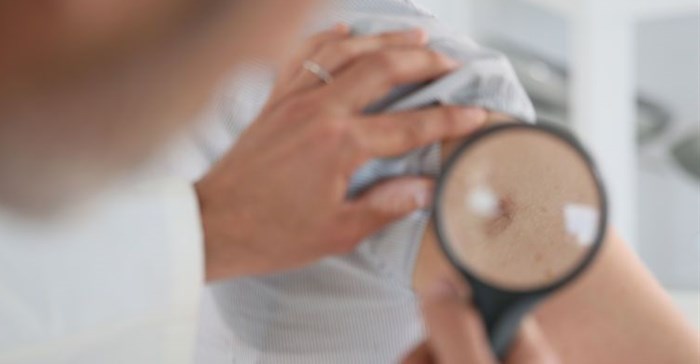
A new study from Stanford University School of Medicine shows that people who develop six or more basal cell carcinomas during a 10-year period are more likely to develop other, unrelated cancers such as , including blood, breast, colon and prostate cancers.
The increased susceptibility is likely caused by mutations in a panel of proteins responsible for repairing DNA damage, the researchers found.
The skin is the largest organ of the body and the most vulnerable to DNA damage caused by the sun’s ultraviolet rays. Try as one might, it’s just not possible to completely avoid sun exposure, which is why proteins that repair DNA damage are important to prevent skin cancers like basal cell carcinoma.
Most of the time this system works well. But sometimes the repair team can’t keep up. Basal cell carcinomas are common — more than 3 million cases a year are diagnosed in the United States alone — and usually highly treatable.
Kavita Sarin, assistant professor of dermatology, and medical student, Hyunje Cho, wondered whether the skin could serve as a kind of canary in the coal mine to reveal an individual’s overall cancer susceptibility. “The skin is basically a walking mutagenesis experiment,” Sarin said. “It’s the best organ to detect genetic problems that could lead to cancers.”
Sarin and Cho studied 61 people treated at Stanford Health Care for unusually frequent basal cell carcinomas — an average of 11 per patient over a 10-year period. They investigated whether these people may have mutations in 29 genes that code for DNA-damage-repair proteins.
“We found that about 20% of the people with frequent basal cell carcinomas have a mutation in one of the genes responsible for repairing DNA damage, versus about 3% of the general population. That’s shockingly high,” Sarin said.
Furthermore, 21 of the 61 people reported a history of additional cancers, including blood cancer, melanoma, prostate cancer, breast cancer and colon cancer — a prevalence that suggests the frequent basal cell carcinoma patients are three times more likely than the general population to develop cancers.
To confirm the findings, the researchers applied a similar analysis to a large medical insurance claims database. Over 13,000 people in the database had six or more basal cell carcinomas; these people also were over three times more likely to have developed other cancers, including colon, melanoma and blood cancers. Finally, the researchers identified an upward trend: the more basal cell carcinomas an individual reported, the more likely that person was to have had other cancers as well.
“I was surprised to see such a strong correlation,” Sarin said. “But it’s also very gratifying. Now we can ask patients with repeated basal cell carcinomas whether they have family members with other types of cancers, and perhaps suggest that they consider genetic testing and increased screening.”
The researchers are continuing to enroll Stanford patients in the study, which is ongoing, to learn whether particular mutations in genes responsible for repairing DNA damage are linked to the development of specific malignancies. They’d also like to conduct a similar study in patients with frequent melanomas. But they emphasised that there’s no reason for people with occasional basal cell carcinomas to worry.